Charles E W Bean, Diaries, AWM38 3DRL 606/254/1 - 1917 - 1933 - Part 6
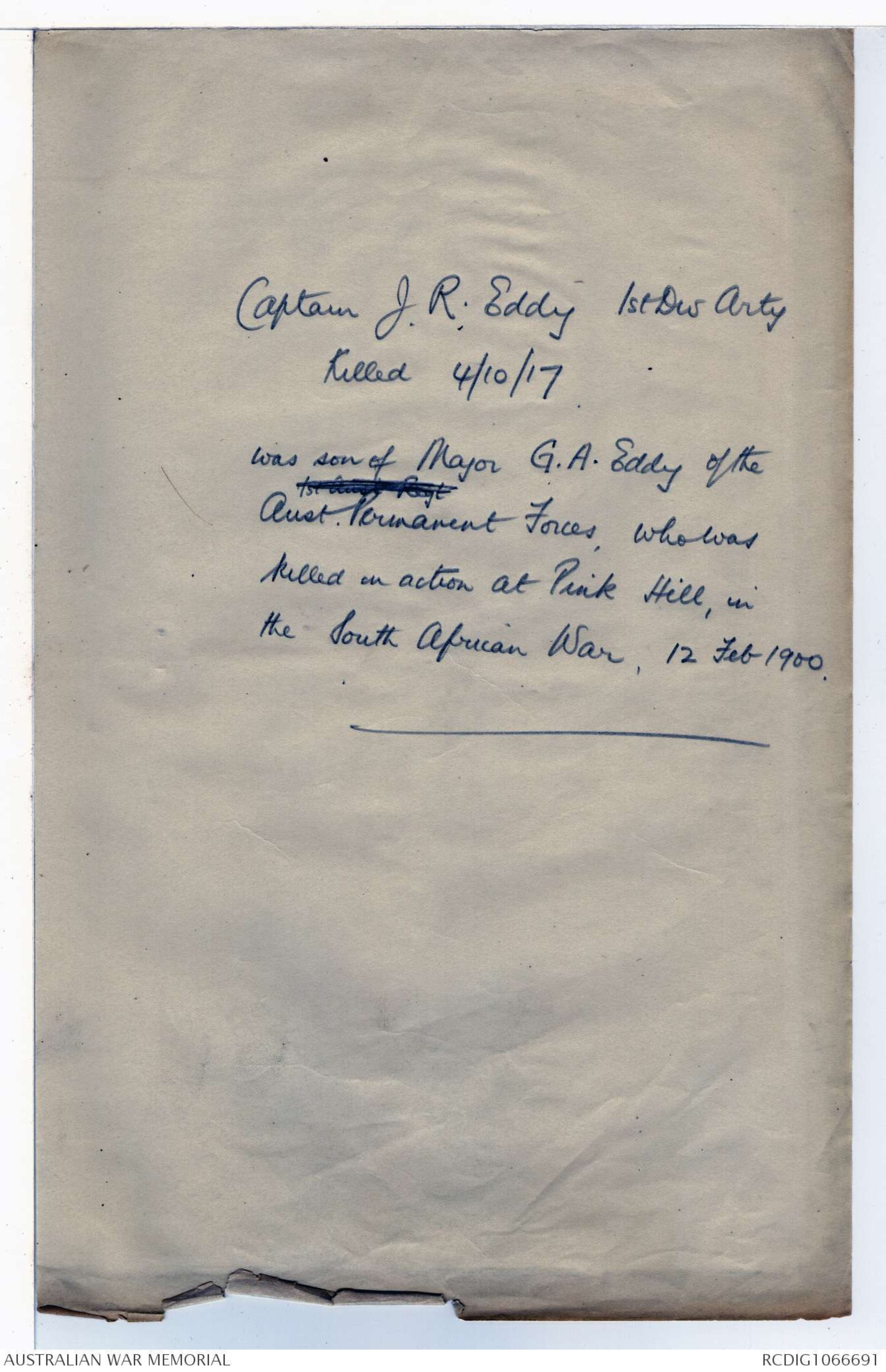
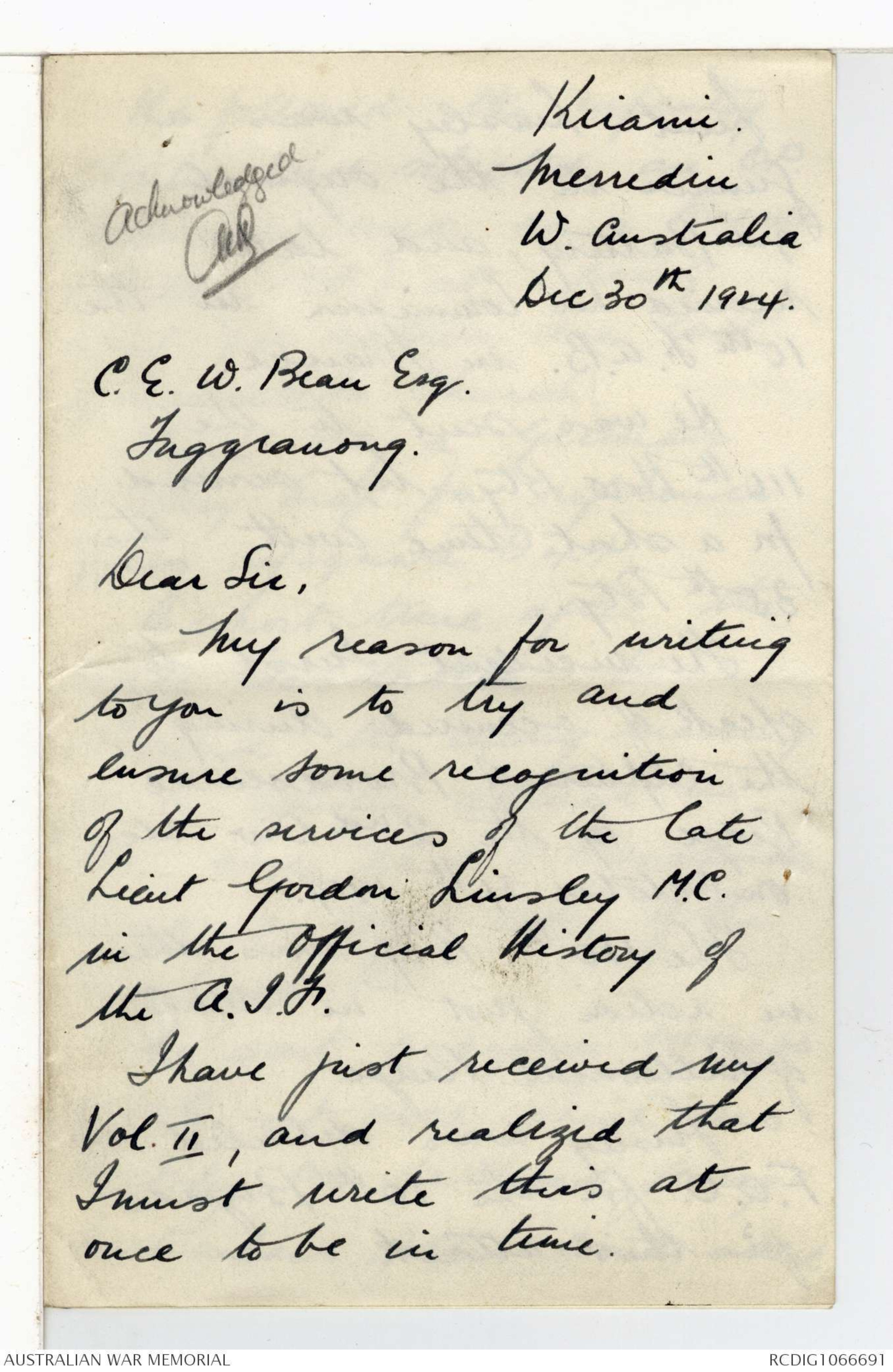
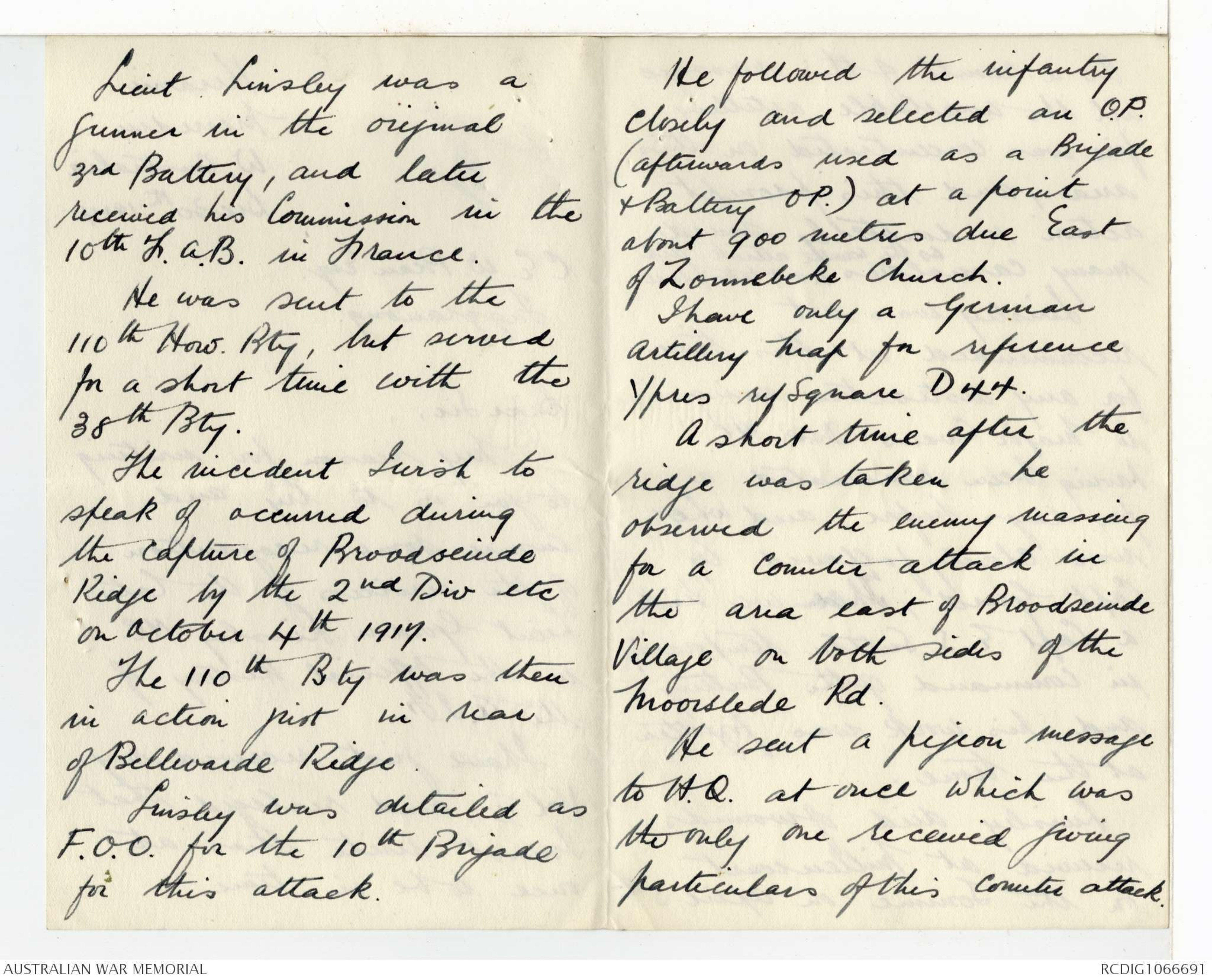
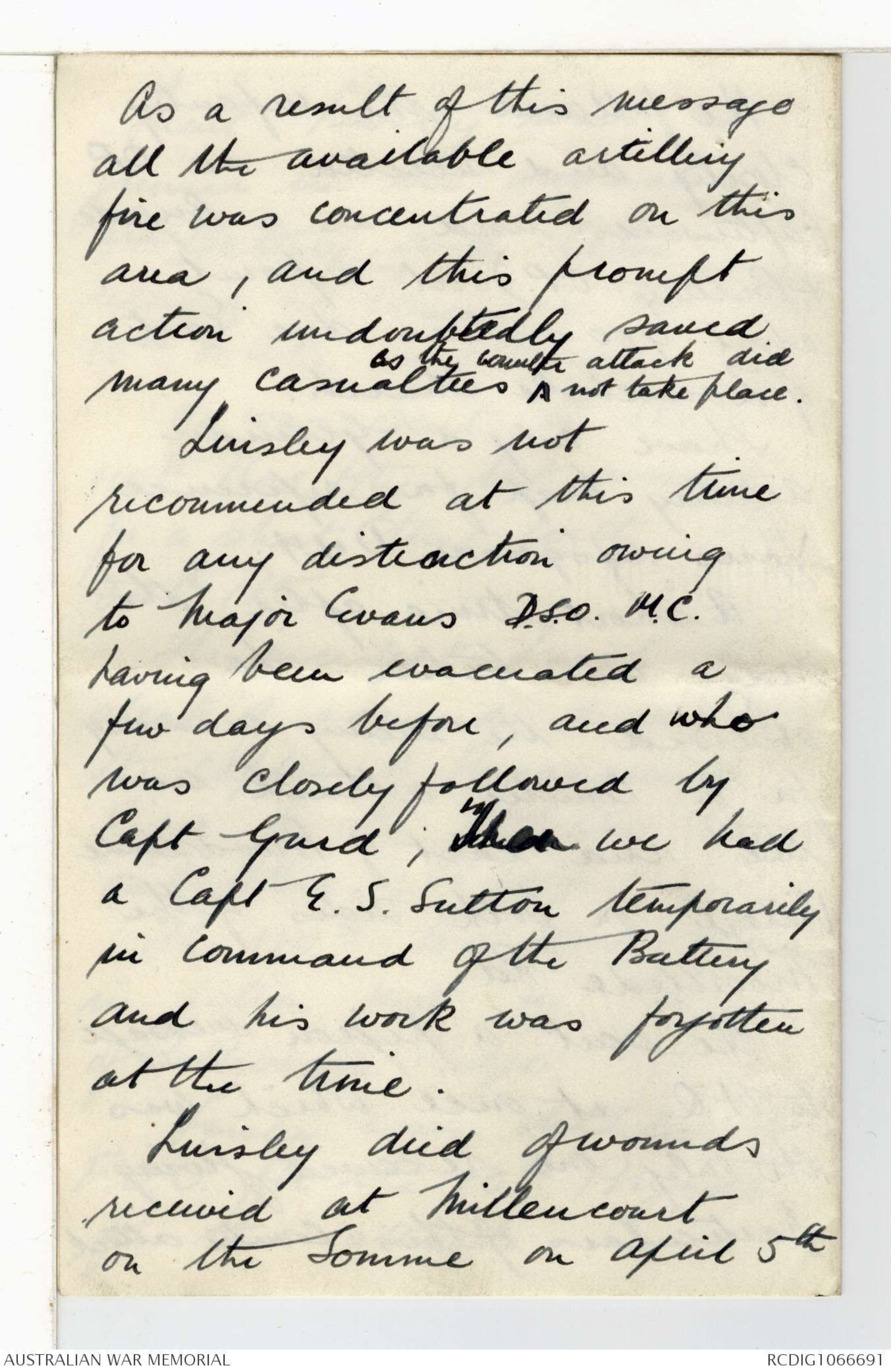
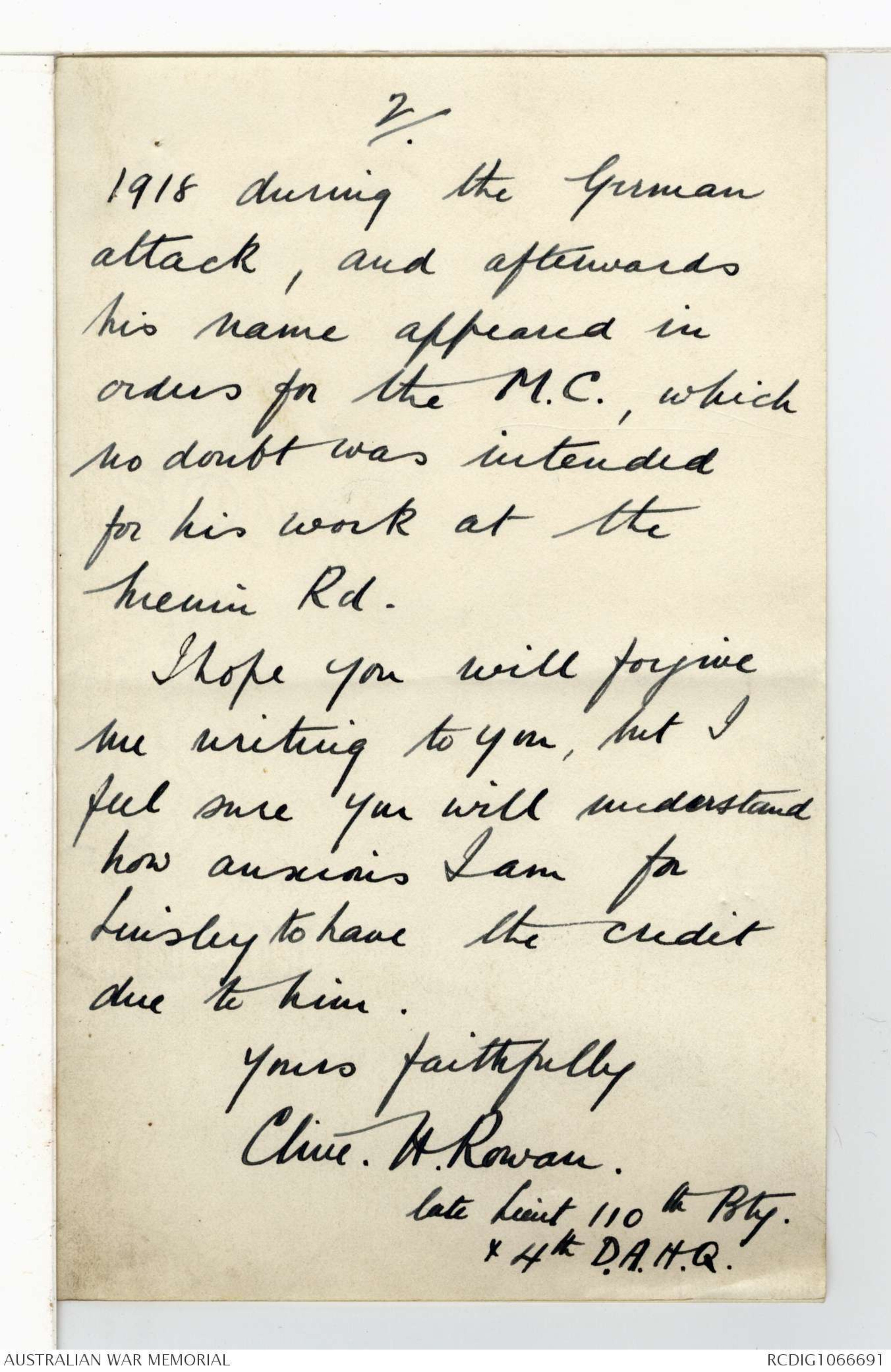
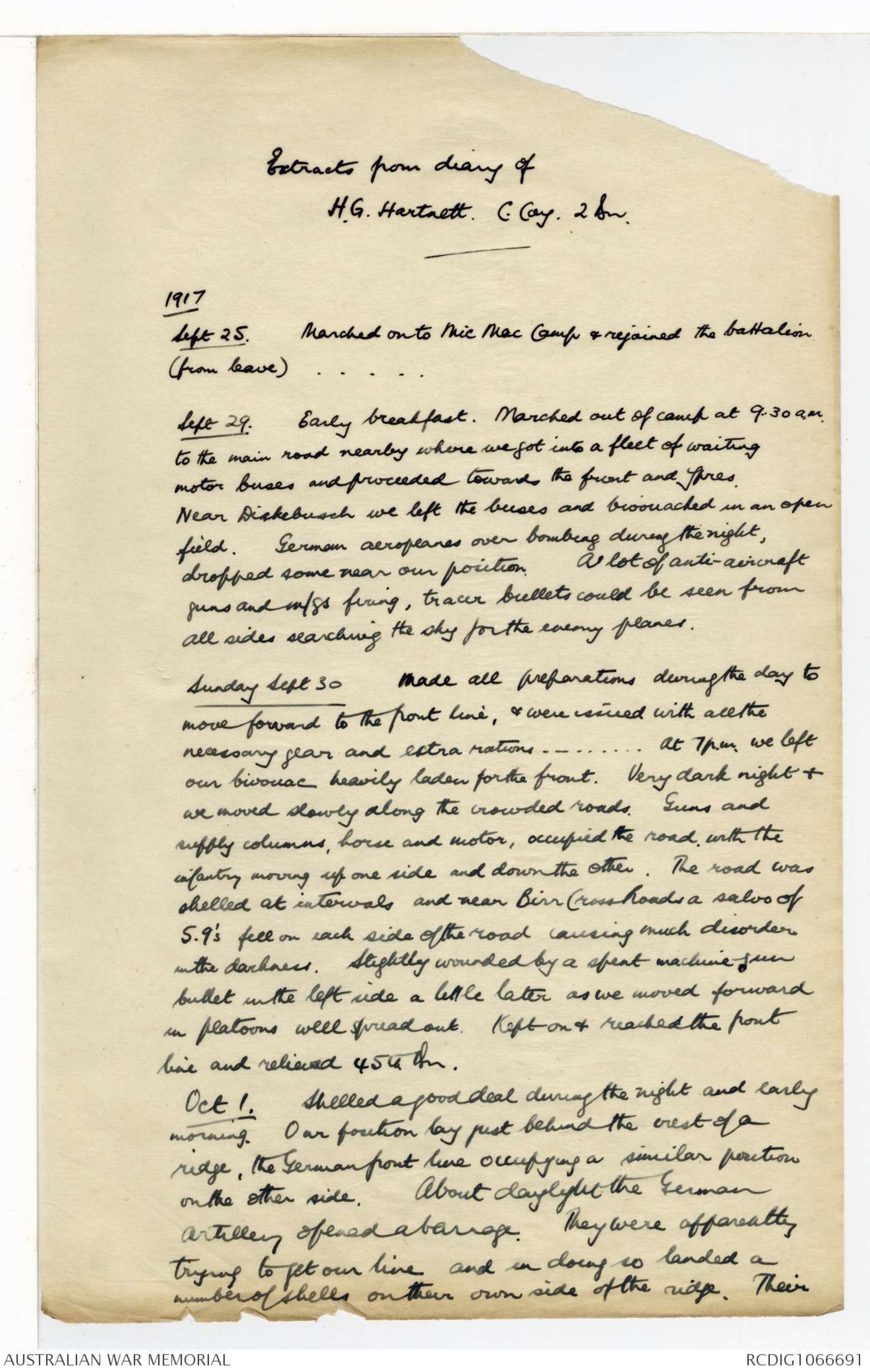
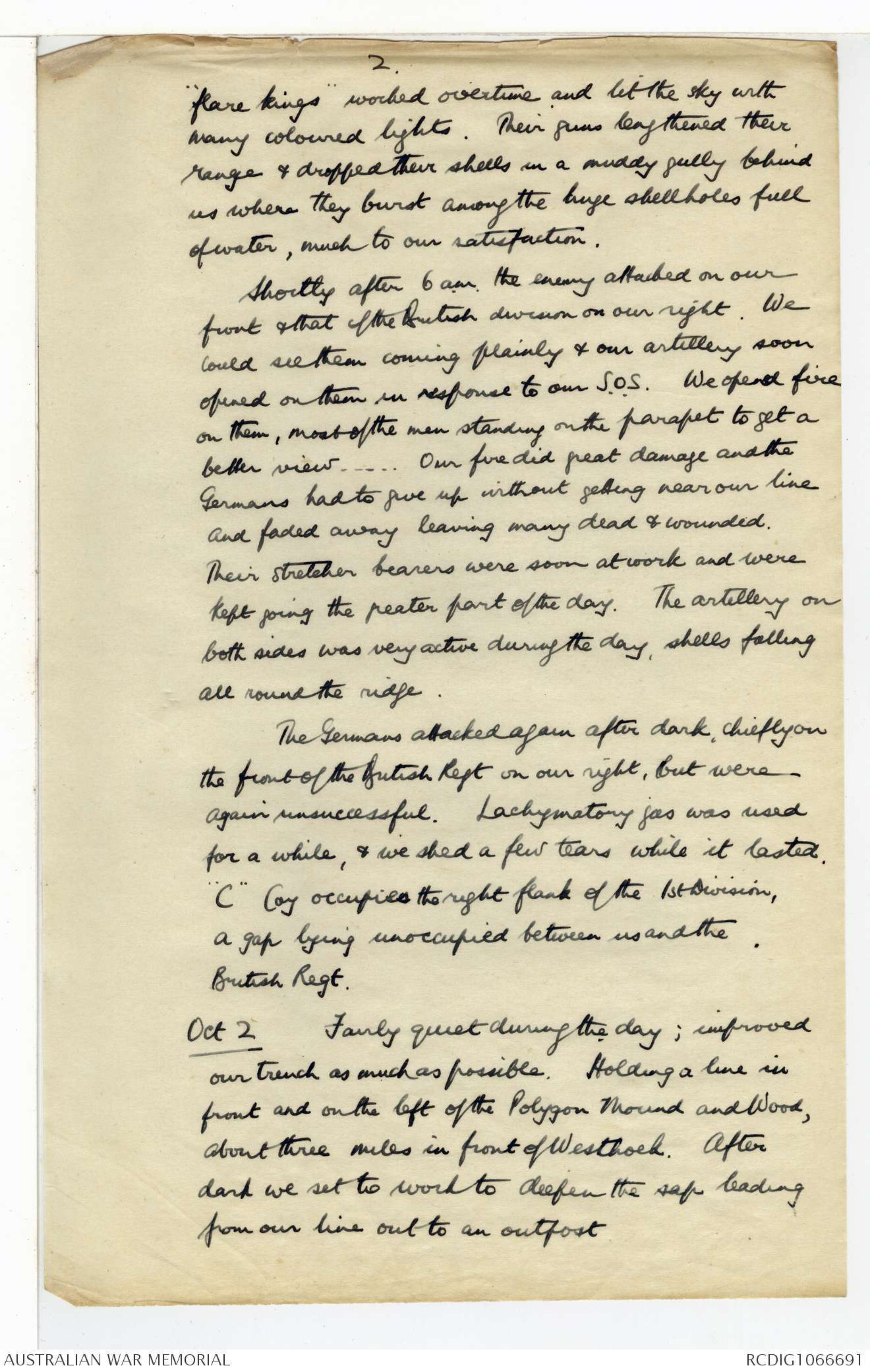
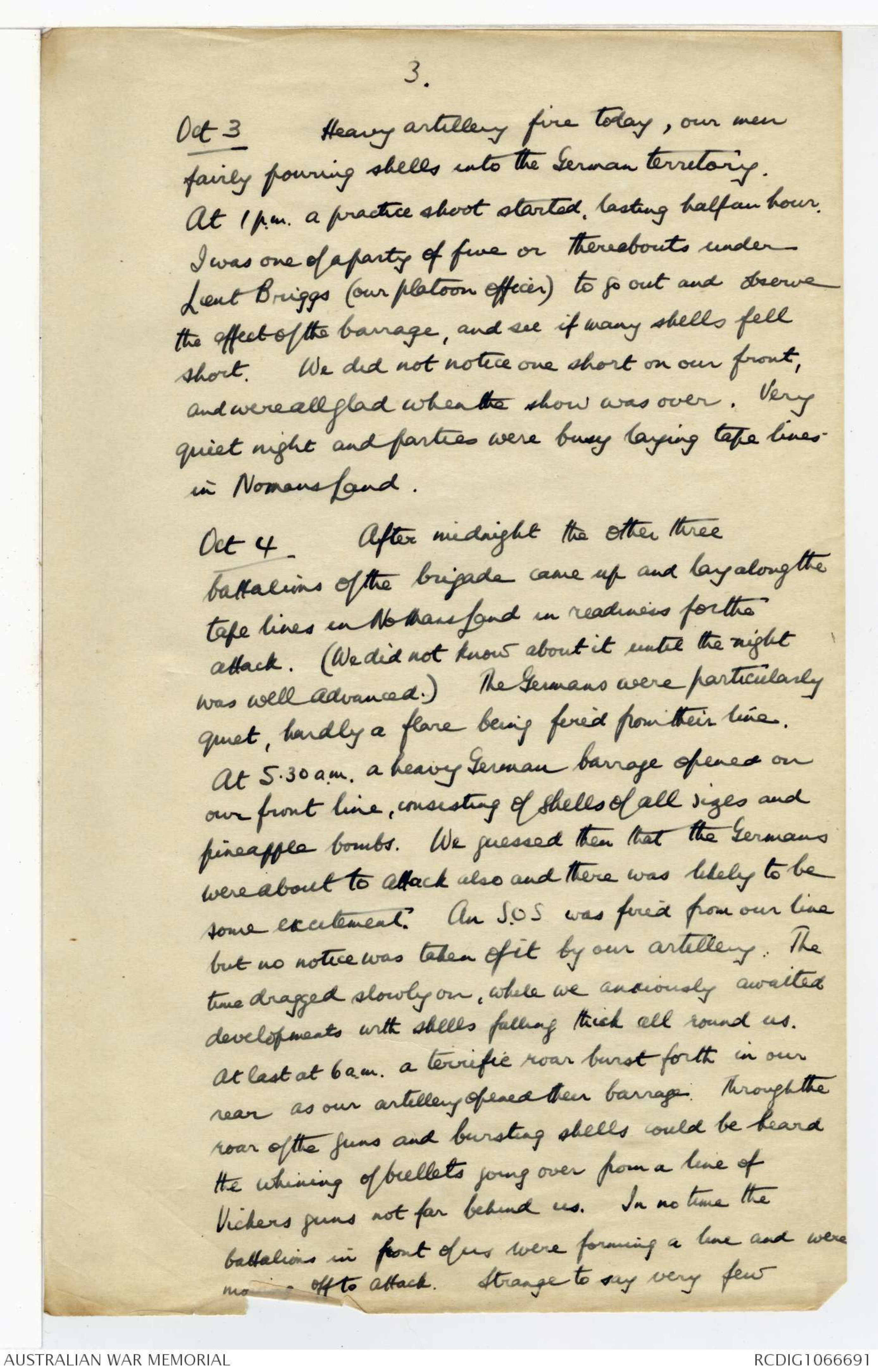
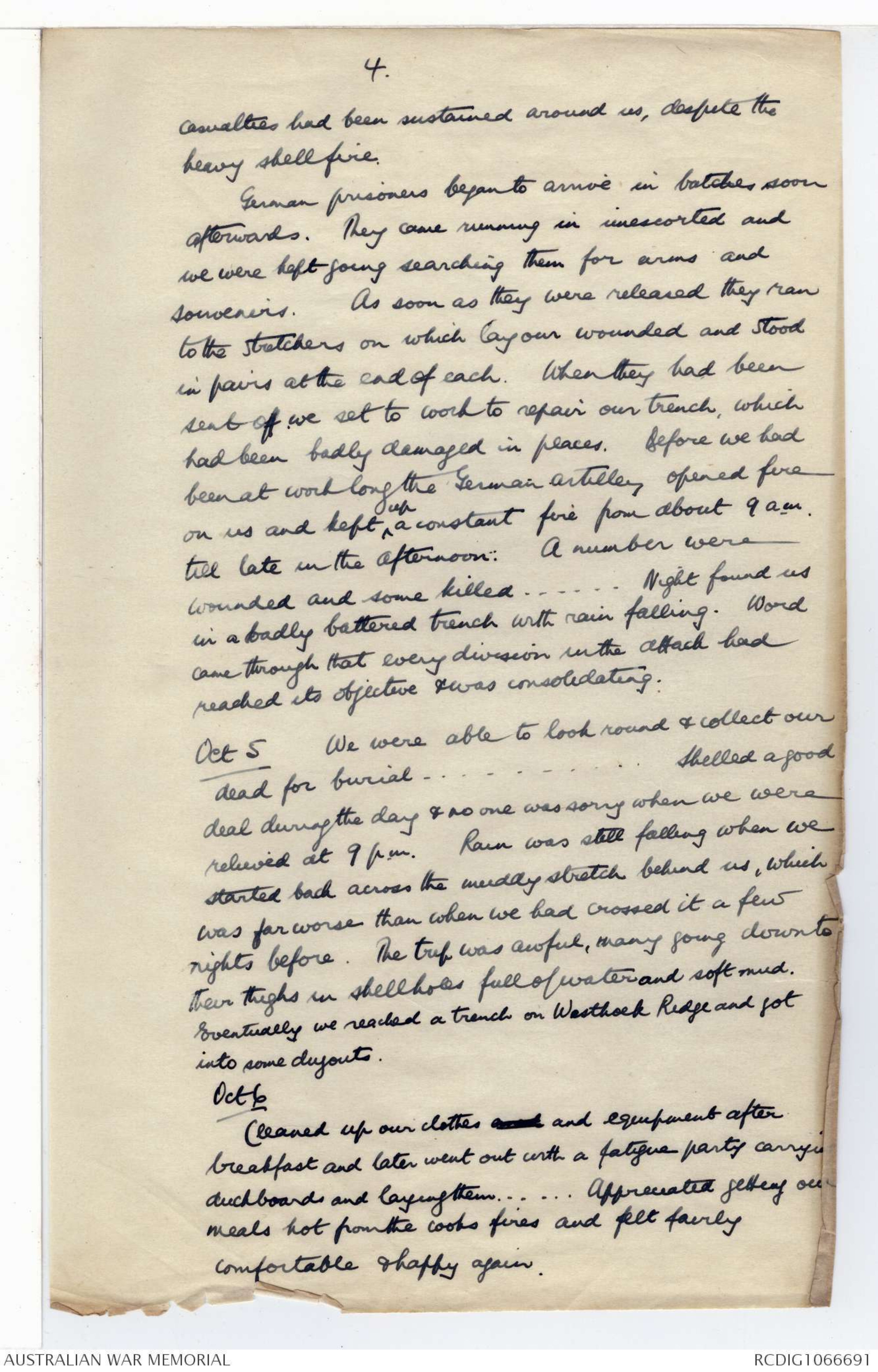
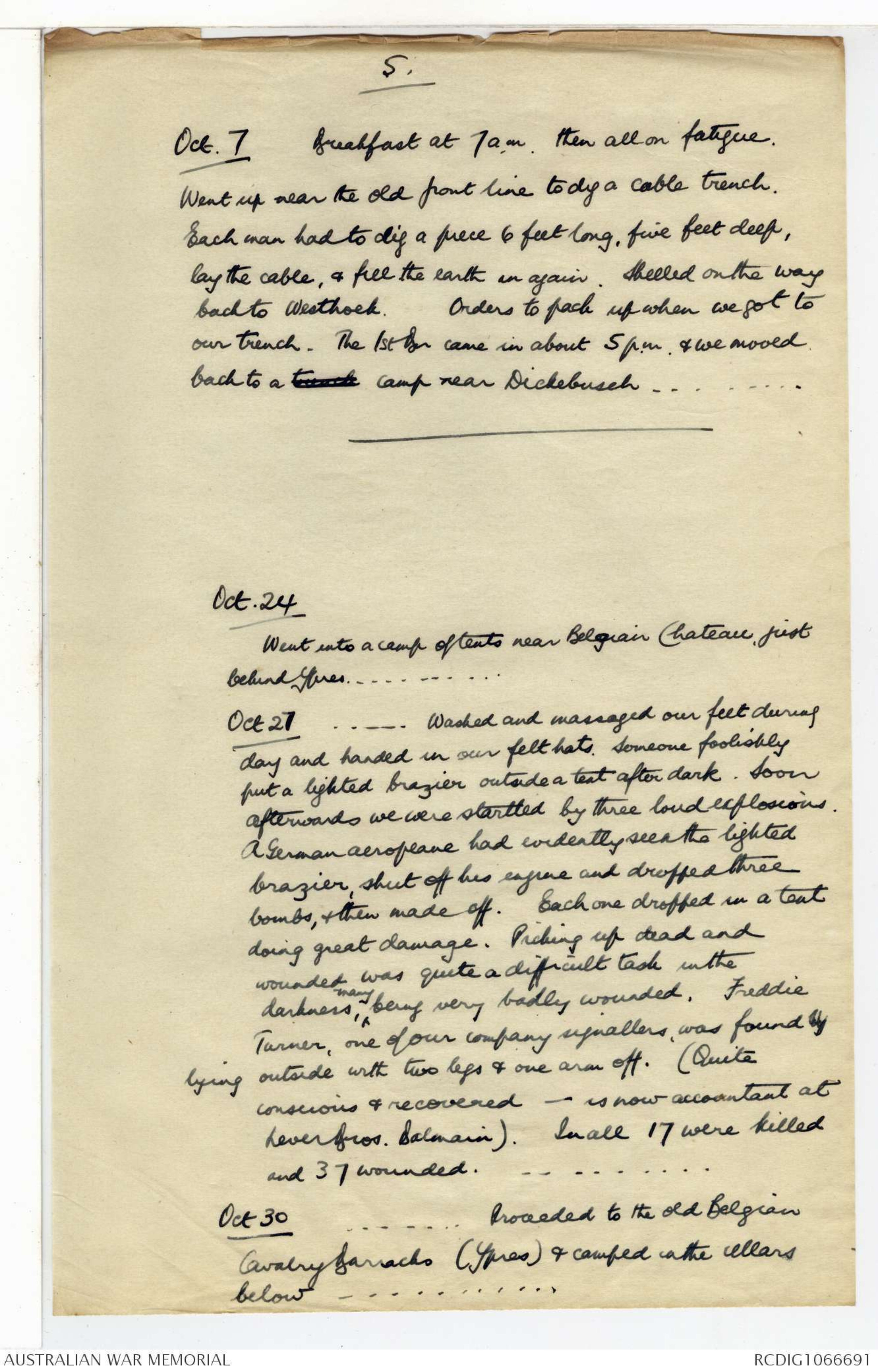
Captain J. R. Eddy 1st Div Arty
killed 4/10/17
was son of Major G. A. Eddy of the1st Aust Regt Aust. Permanent Forces, who was
killed in action at Pink Hill, in
the South African War, 12 Feb 1900.
[*Acknowledged
CEWB*]
Kiami.
Merredin
W. Australia
Dec 30th 1924.
C. E. W. Bean Esq.
Tuggranong.
Dear Sir,
My reason for writing
to you is to try and
ensure some recognition
of the services the late
Lieut Gordon Linsley M.C.
in the official History of
the A.I.F.
I have just received my
Vol. II, and realized that
I must write this at
once to be in time.
Lieut Linsley was
gunner in the original
3rd Battery, and later
received his Commission in the
10th F.A.B. in France.
He was sent to the
110th How. Bty, but served
for a short time with the
38th Bty.
The incident I wish to
speak of occurred during
the capture of Broodseinde
Ridge by the 2nd Div etc
on October 4th 1917.
The 110th Bty was then
in action just in rear
of Bellevarde Ridge.
Linsley was detailed as
F.O.O. for the 10th Brigade
for this attack.
He followed the infantry
closely and selected an O.P.
(afterwards used as a Brigade
& Battery OP.) at a point
about 900 metres due East
of Zonnebeke Church.
I have only a German
Artillery Map for reference
Ypres ref square D44.
A short time after the
ridge was taken he
observed the enemy massing
for a counter attack in
the area east of Broodseinde
Village on both sides of the
Moorslede Rd.
He sent a pigeon message
to H.Q. at once which was
the only one received giving
particulars of this counter attack.
As a result of this message
all the available artillery
fire was concentrated on this
area, and this prompt
action undoubtedly saved
many casualties ^as the counter attack did not take place.
Linsley was not
recommended at this time
for any distinction owing
to Major Evans D.S.O. M.C.
having been evacuated a
few days before, and who
was closely followed by
Capt Gurd; Then we had
a Capt E. S. Sutton temporarily
in Command of the Battery
and his work was forgotten
at the time.
Linsley died of wounds
received at Millencourt
on the Somme on April 5th
2.
1918 during the German
attack, and afterwards
his name appeared in
orders for the M.C., which
no doubt was intended
for his work at the
Menin Rd.
I hope you will forgive
me writing to you, but I
feel sure you will understand
how anxious I am for
Linsley to have the credit
due to him
yours faithfully
Clive. H. Rowan.
late Lieut 110th Bty.
x 4th D.A.H.Q.
Extracts from diary of
H.G. Hartnett. C Coy. 2 Bn.
1917
Sept 25. Marched on to Mic Mac Camp & rejoined the battalion
(from leave) . . . .
Sept 29. Early breakfast. Marched out of camp at 9.30 am.
to the main road nearby where we got into a fleet of waiting
motor buses and proceeded toward the front and Ypres.
Near Dickebusch we left the buses and bivouacked in an open
field. German aeroplanes over bombing during the night,
dropped some near our position. A lot of anti-aircraft
guns and m/gs firing, tracer bullets could be seen from
all sides searching the sky for the enemy planes.
Sunday Sept 30 Made all preparations during the day to
move forward to the front line, & were issued with all the
necessary gear and extra rations . . . . . At 7 p.m. we left
our bivouac heavily laden for the front. Very dark night &
we moved slowly along the crowded roads. Guns and
supply columns, horse and motor, occupied the road, with the
infantry moving up one side and down the other. The road was
shelled at intervals and near Birr Cross Roads a salvo of
5.9's fell on each side of the road causing much disorder
in the darkness. Slightly wounded by a spent machine gun
bullet in the left side a little later as we moved forward
in platoons well spread out. Kept on & reached the front
line and relieved 45th Bn.
Oct 1. Shelled a good deal during the night and early
morning. Our position lay just behind the crest of a
ridge, the German front here occupying a similar position
on the other side. About daylight the German
Artillery opened a barrage. They were apparently
trying to get our line and in doing so landed a
number of shells on their own side of the ridge. Their
2.
"flare kings" worked overtime and lit the sky with
many coloured lights. Their guns lengthened their
range & dropped their shells in a muddy gully behind
us where they burst among the huge shellholes full
of water, much to our satisfaction
Shortly after 6 a.m. the enemy attacked on our
front & that of the British division on our right. We
could see them coming plainly & our artillery soon
opened on them in response to our S.O.S. We open fire
on them, most of the men standing on the parapet to get a
better view. Our fire did great damage and the
Germans had to give up without getting near our line
and faded away leaving many dead & wounded.
Their stretcher bearers were soon at work and were
kept going the greater part of the day. The artillery on
both sides was very active during the day, shells falling
all round the ridge.
The Germans attacked again after dark, chiefly on
the front of the British kept on our right, but were
again unsuccessful. Lachymatory gas was used
for a while & we shed a few tears while it lasted.
"C" Coy occupies the right flank of the 1st Division,
a gap being unoccupied between us and the
British Regt.
Oct 2 Fairly quiet during the day; improved
our trench as much as possible. Holding a line in
front and on the left of the Polygon Mound and Wood,
about three miles in front of Westhoek. After
dark we set to work to deepen the sap leading
from our line out to an outpost
3.
Oct 3 Heavy artillery fire today, our men
fairly pouring shells into the German territory.
At 1 p.m. a practice shoot started, lasting half an hour.
I was one of a party of five or thereabouts under
Lieut Briggs (our platoon officer) to go out and observe
the effect of the barrage, and see if many shells fell
short. We did not notice one short on our front,
and were all glad when the show was over. Very
quiet night and parties were busy laying tape lines
in No Mans Land
Oct 4 After midnight the other three
battalions of the brigade came up and lay along the
tape lines in NoMan'sLand in readiness for the
attack. (We did not know about it until the night
was well advanced.) The Germans were particularly
quiet, hardly a flare being fired from their line.
At 5.30 a.m. a heavy German barrage opened on
our front line, consisting of shells of all sizes and
pineapple bombs. We guessed then that the Germans
were about to attack also and there was likely to be
some excitement. An S.OS was fired from our line
but no notice was taken of it by our artillery. The
time dragged slowly on, while we anxiously awaited
developments with shells falling thick all round us.
At last at 6 a.m. a terrific roar burst forth in our
rear as our artillery opened their barrage. Through the
roar of the guns and bursting shells could be heard
the whining of bullets going over from a line of
Vickers guns not far behind us. In no time the
battalions in front of us were forming a line and were
moving off to attack. Strange to say very few
4.
casualties had been sustained around us, despite the
heavy shellfire.
German prisoners began to arrive in batches soon
afterwards. They came running in unescorted and
we were kept going searching them for arms and
souvenirs. As soon as they were released they ran
to the stretchers on which lay our wounded and stood
in pairs at the end of each. When they had been
sent off we set to work to repair our trench, which
had been badly damaged in places. Before we had
been at work long the German artillery opened fire
on us and kept ^up a constant fire from about 9 a.m.
till late in the afternoon. A number were
wounded and some killed. . . . Night found us
in a badly battered trench with rain falling. Word
came through that every division in the attack had
reached its objective & was consolidating.
Oct 5 We were able to look round & collect our
dead for burial. . . . . . . . . . . Shelled a good
deal during the day & no one was sorry when we were
relieved at 9 p.m. Rain was still falling when we
started back across the muddy stretch behind us, which
was far worse than when we had crossed it a few
nights before. The trip was awful, many going down to
their thighs in shellholes full of water and soft mud.
Eventually we reached a trench on Westhoek Ridge and got
into some dugouts.
Oct 6 Cleaned up our clothes and and equipment after
breakfast and later went out with a fatigue party carrying
duckboards and laying them. . . . Appreciated getting our
meals hot from the cooks fires and felt fairly
comfortable & happy again.
5.
Oct 7 Breakfast at 7 a.m. then all on fatigue.
Went up near the old front line to dig a cable trench,
Each man had to dig a piece 6 feet long, five feet deep,
lay the cable, & fill the earth in again. Shelled on the way
back to Westhoek. Orders to pack up when we got to
our trench. The 1st Bn came in about S p.m. & we moved
back to a camp near Dickebusch.
Oct 24
Went into a camp of tents near Belgian Chateau, just
behind Ypres. . . . . . . .
Oct 27 . ._ _ Washed and massaged our feet during
day and handed in our felt hats. Someone foolishly
put a lighted brazier outside a tent after dark. Soon
afterwards we were startled by three loud explosions.
A German aeroplane had evidently seen the lighted
brazier, shut off his engine and dropped three
bombs, & then made off. Each one dropped in a tent
doing great damage. Picking up dead and
wounded was quite a difficult task in the
darkness, ^many being very badly wounded. Freddie
Turner, one of our company signallers, was found by
lying outside with two legs & one arm off. (Quite
conscious & recovered - is now accountant at
Lever Bros. Balmain). In all 17 were killed
and 37 wounded. . . . . . . . . .
Oct 30. . . . . . Proceeded to the old Belgian
Cavalry Barracks (Ypres) & camped in the cellars
below. . . . . . . . .
 Deb Parkinson
Deb ParkinsonThis transcription item is now locked to you for editing. To release the lock either Save your changes or Cancel.
This lock will be automatically released after 60 minutes of inactivity.